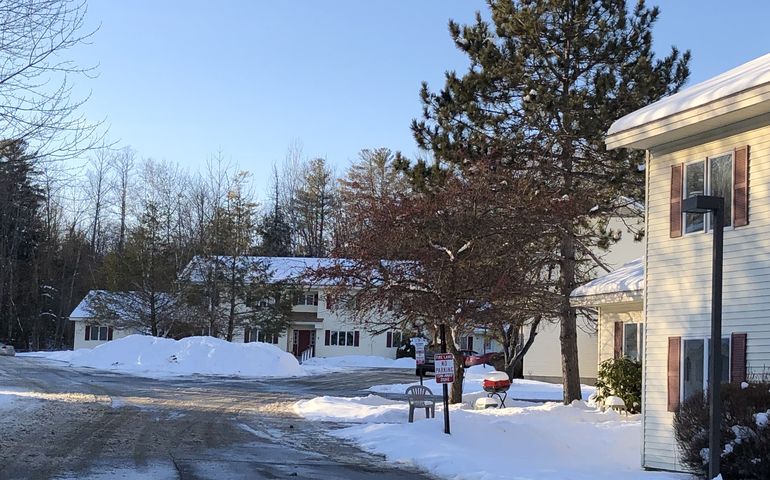Insider Notebook: Affordable housing initiative gets Mills boost
 Photo / Maureen Milliken
Oakview Apartments in Oakland are part of the USDA Rural Development 515 program. Thousands of apartments undre the program established 40 years ago may no longer be dedicated affordable housing soon.
Photo / Maureen Milliken
Oakview Apartments in Oakland are part of the USDA Rural Development 515 program. Thousands of apartments undre the program established 40 years ago may no longer be dedicated affordable housing soon.
One of the louder and longer periods of sustained applause at Gov. Janet Mills' state of the state address Tuesday night was when she called for more affordable housing support.
Specifically, she cited the Maine Affordable Housing Tax Credit, sponsored by Assistant House Majority Leader Ryan Fecteau, D-Biddeford, which Mills said would create nearly 1,000 additional affordable homes over eight years, increasing Maine’s current rate of production by 50%.
Send the bill to her, she said, and she'll sign it.
The legislation was proposed by the Maine Affordable Housing Coalition, and would leverage federal money not currently available to Maine with $80 million in state tax credits over four years.
The legislation sets aside 10% of the credit to preserve some of the affordable housing established by USDA Rural Development 40 years ago that ares now in danger of losing affordability restrictions. The USDA program financed nearly 2,500 affordable homes in 326 developments across the state.
For new housing, 30% of the credit would go to senior homes and 20% is targeted for rural areas.
The bill would leverage tax credits the state currently doesn't use. The state uses the 9% federal Low Income Housing Tax Credit program, which is administered by MaineHousing. With those credits, a developer of new construciton can claim 9% of a project's cost for the credit if it meets the low-income stanards. They "are a limited, oversubscribed federal resource" that flows to Maine each year based on population size, said Greg Payne, director of the coalition, in a March MEREDA blog post.
Aside from the 9% program, there's also a 4% program that mostly covers housing being rehabilitated or bond-financed housing. The program covers about 35% of the cost of a typical new affordable housing development, but they're only available if the state contributes.
The state and federal money would not only allow more than 1,000 affordable homes to be built in the next four years, but would "create jobs and critical economic activity statewide in the construction, engineering and design sectors," said Payne.
Supporters of the bill Associated General Contractors of Maine, Avesta Housing, the Genesis Community Loan Fund, MaineHousing, the Maine Council on Aging, among others.
Fecteau told Mainebiz in May, that while the measure is a step in the right direction, there's still a long way to go to increase the supply of affordable housing.
"I don't think we've taken the issue seriously enough," he said. "We have tapped into the HOME Fund and redirected money elsewhere for the past 16 years. That's catching up to us, and we're really far behind ... We have to take this issue seriously."
MEREDA award winners
Aside from the day of real estate forecasting for 2020, the Maine Real Estate and Development Association also recognized five individuals for their contributions to the industry — an architect, an interiors expert, a city planner, a lawyer and an artisan.
MEREDA’s Annual Awards recognize significant and lasting contribution of responsible real estate development in Maine in 2019 and went to Brian Curley, president of CHA Architecture; Bruce Jones, recently retired from Creative Office Pavilion; Jeff Levine, Portland's former director of planning and urban development; Shannon Richards of Hay Runner; and Matt Worthen of Eaton Peabody.
Curley received the 2019 Robert B. Patterson, Jr. Founders’ Award, recognizing his contributions and support of MEREDA as a "highly effective volunteer, providing significant leadership and guidance." He was a member of MEREDA’s board of directors from 2011 to 2019, vice president for four of those years.
Jones, who retired from the MEREDA board in December, was named President's Award winner. Vogel said Jones was an exceptionally dedicated volunteer, in an organization that relies heavily on volunteers and its board, who contributed with energy on every level. Jones joined MEREDA in 2010, serving on the board for seven years, as the vice president for four years.
Levine, who is now adjunct faculty at the Muskie School of Public Service at USM, and at the Massachusetts Institute of Technology Department of Urban Studies, received the Public Policy Award. The award recognizes those who've had a considerable impact on public policy changes that benefit responsible real estate development in Maine.
Richards and Worthen were awarded Volunteer of the Year. The pair spearheaded the development of the 2019 Spring Conference, "which fostered a thought-provoking discussion around the future of housing in Maine," and served as the program's moderators.
Curling club still seeking space of its own
The Pine Tree Curling Club is continuing its search, as reported a year ago, for space where the group can install ice that would be only used for curling.
The club is seeking 12,000-15,000 square feet of warehouse space that it could retrofit, and "is exploring possible locations and funding sources to make that dream a reality so that more people can experience the sport," said club President Dave Florig.
Availability of industrial space in southern Maine continues to be tight — the vacancy rate of industrial space in greater Portland is 1.84%, Justin Lamontagne, of NAI The Dunham Group, said at last week's MEREDA 2020 Forecast and Conference.
The club, which uses Portland's Troubh Ice Arena, is going strong despite not having a home. It has close to 100 members, and recently elected a slate of officers, including Florig, Vice President Matt Albert, Treasurer Steve Nolt, Secretary Naneen Chace-Ortiz, and board members Annika Cook and Michael Garnett. The club is dedicated to teaching and growing Olympic curling in the state, Florig said.










0 Comments